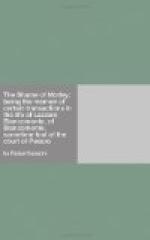It was in vain that I protested that a couple of knaves might surely be found. She answered me that such as were in Cagli were there because they would not be elsewhere.
The lady’s face grew clouded as she listened, for from my insistence she shrewdly inferred that it imported to be gone.
“There is your ostler,” quoth I at last. “He will do for one.”
“He is the only man I have. My husband and my sons are gone to Pesaro.”
“Yet spare us this one, and you shall be well paid his services.”
But no bribe could tempt her to give way, and no doubt she was well-advised, for she contended that there was work to be done such as was beyond her years and strength, and that if she sent her ostler off, as well might she close her inn—a thing that was impossible.
Here, then, was an obstacle with which I had not reckoned. It was impossible to send the lady off alone, to travel a distance of some ten leagues, and the most of it by night—for if she would make sure of escaping, she must journey now without pause until she came to Pesaro.
And then, in a flash, it occurred to me that here lay the means, ready to my hand, by avail of which I might boldly re-enter Pesaro despite my banishment, and discharge my errand to Lucrezia Borgia. For, surely, considering the mission on which ostensibly I should be returning—as the saviour and protector of his kinswoman—Giovanni Sforza could not enforce that ban against me. Next I bethought me of the other aspect that the business wore. In fooling Ramiro I had thwarted the Borgia ends; in rescuing Madonna Paola I had perhaps set at naught the Cardinal of Valencia’s aims. If so, what then? It would seem that because the lady’s eyes were mild and sweet, and because her beauty had so deeply wrought upon me, I had indeed fooled away my chance of salvation from the life and trade that were grown hateful to me. For back to Rome and Cesare Borgia I should dare go no more. Clearly I had burned my boats, and I had done it almost unthinkingly, acting upon the good impulse to befriend this lady, and never reckoning the cost down to its total. For all that the thing I had done, and what I might yet do, should offer me the means I needed to enter Pesaro without danger to my neck, I did not see that I was to derive great profit in the end—unless my profit lay in knowing that I had advanced the ruin of Giovanni Sforza by delivering my letter to Lucrezia. That at any rate was enough incentive clearly to define for me the line that I should take through this tangle into which the ever-jesting Fates had thrust me.
I was still at my thoughts, still pondering this most perplexing situation, the hostess standing silent by the door, when suddenly Madonna Paola spoke.
“Sir,” said she, in faltering accents, “I—I have not the right to ask you, and I stand already so deeply in your debt. Not a doubt of it, but it will have inconvenienced you to have journeyed thus far to inform me of the flight of my grooms. Yet if you could—” She paused, timid of proceeding, and her glance fell.




